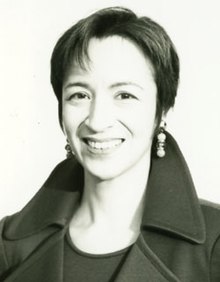Anna Ogino
Anna Ogino | |
|---|---|
 Anna Ogino in 2005 | |
| Native name | 荻野 アンナ |
| Born | Anna Gaillard Kanagawa, Japan |
| Occupation | Writer, professor |
| Language | Japanese |
| Citizenship | Japanese |
| Education | Paris-Sorbonne University |
| Alma mater | Keio University |
| Genre | Fiction |
| Notable works |
|
| Notable awards |
|
Anna Ogino (荻野 アンナ, Ogino Anna, born November 7, 1956)[1] is a Japanese author and emeritus professor of literature at Keio University. She has won the Akutagawa Prize, the Yomiuri Prize, and the Itō Sei Literature Prize.
Early years[edit]
Ogino was born as Anna Gaillard in Naka-ku, Yokohama, Kanagawa Prefecture, to a Japanese mother and a French-American father.[2] Her mother, Kinuko Emi, was a prominent abstract painter.[3] Ogino was naturalized during elementary school, and received her undergraduate and master's degree in French literature from Keio University, as well as receiving a scholarship to Paris-Sorbonne University to study Rabelais. In 2002 she became a full professor at Keio.[4]
Career[edit]
Ogino began writing in 1983 as text author for comic strips about mermaids.[1] She won the 1991 Akutagawa Prize for Seoi-mizu (背負い水, Water Burden). Her 1991 book Watakushi no aidokusho (私の愛毒書, My love-hate affair with books), a critical novel that compares eminent male Japanese authors to different types of foods, has received scholarly attention for its subversive use of parodic language.[5][6] In 2002 she received the 53rd Yomiuri Prize for Horafuki Anri no bōken (ホラ吹きアンリの冒険, The Adventures of Henri the Braggart). In 2008 she received the 19th Itō Sei Literature Prize for Kani to kare to watashi (蟹と彼と私, The Crab, Him and Me), "a tour de force of parody and trauma chronicling her partner’s struggle with, and eventual death from, cancer."[7]
Recognition[edit]
- 1991 105th Akutagawa Prize (1991上)[8]
- 2002 53rd Yomiuri Prize (2001年度)[9]
- 2008 19th Itō Sei Literature Prize[10]
Works and translations[edit]
- Yukitai (遊機体, Floating Objects), Bungeishunjū, 1990, ISBN 9784163121802
- Watakushi no aidokusho (私の愛毒書, My Love-Hate Affair with Books), Fukutake Shoten, ISBN 9784828823980
- Seoi-mizu (背負い水, Water Burden), Bungeishunjū, 1991, ISBN 9784163127606
- Horafuki Anri no bōken (ホラ吹きアンリの冒険, The Adventures of Henri the Braggart), Bungeishunjū, 2001, ISBN 9784163198200
- Kani to kare to watashi (蟹と彼と私, The Crab, Him and Me), Shueisha, 2007, ISBN 9784087748727
- Kashisugawa (カシス川, River of Cassis), Bungeishunjū, 2017, ISBN 9784163907345
- "Mama Drinks Her Tea," trans. Vyjayanthi Ratnam Selinger in More Stories by Japanese Women Writers: An Anthology, ed. Kyoko Selden and Noriko Lippit (M.E. Sharpe, 2011), 102–126.
- "Nue," trans. Amanda C. Seaman. U.S.-Japan Women's Journal 58 (2020): 21–34.
References[edit]
- ^ a b Shibata Schierbeck, Sachiko; Edelstein, Marlene R. (1994). Japanese women novelists in the 20th century: 104 biographies, 1990-1993. Museum Tusculanum Press. ISBN 9788772892689.
- ^ McKeon, Midori (2001). "Ogino Anna's Gargantuan Play in Tales of Peaches". In Copeland, Rebecca L.; Ramirez-Christensen, Esperanza (eds.). The Father-Daughter Plot: Japanese Literary Women and the Law of the Father. University of Hawaii Press. pp. 327–367. ISBN 9780824824389.
- ^ "荻野アンナのキリギリス式老後「亡き母・江見絹子の作品を残そうと一大決心。老後資金をつぎこんで」 お金はあの世にはもっていけないから|お金|婦人公論.jp". 婦人公論.jp (in Japanese). Retrieved 2022-04-14.
- ^ "Professor Ogino Anna". Keio University. Retrieved September 10, 2018.
- ^ Aoyama, Tomoko (1994). "The Love that poisons: Japanese parody and the new literacy". Japan Forum. 6 (1): 35–46. doi:10.1080/09555809408721499.
- ^ Abe Auestad, Reiko (1998). "Ogino Anna and parodic language". Japan Forum. 10 (1): 31–45. doi:10.1080/09555809808721602.
- ^ Seaman, Amanda (2020). "Introduction to 'Nue'". U.S.-Japan Women's Journal. 58: 21. doi:10.1353/jwj.2020.0007. S2CID 234772779.
- ^ "芥川賞受賞者一覧" [List of Akutagawa Prize Winners] (in Japanese). 日本文学振興会. January 1, 2018. Retrieved July 7, 2018.
- ^ "読売文学賞 第51回(1999年度)~第60回(2008年度)" [Yomiuri Prizes from 51st (FY1999) to 60th (FY2008)] (in Japanese). Yomiuri Shimbun. Archived from the original on September 11, 2018. Retrieved September 10, 2018.
- ^ "伊藤整文学賞". 伊藤整文学賞の会 (in Japanese). Retrieved September 8, 2018.
External links[edit]
- J'Lit | Authors : Anna Ogino | Books from Japan (in English)
